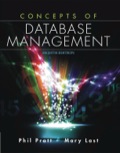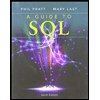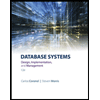
EBK CONCEPTS OF DATABASE MANAGEMENT
8th Edition
ISBN: 8220100706004
Author: Last
Publisher: Cengage Learning US
expand_more
expand_more
format_list_bulleted
Question
Chapter 4, Problem 6CATC
To determine
To specify integrity constraint that the distance of trip should be greater than or equal to 4.
Expert Solution & Answer
Want to see the full answer?
Check out a sample textbook solution
Students have asked these similar questions
make corrections of this program based on the errors shown. this is CIS 227 .
Create 6 users: Don, Liz, Shamir, Jose, Kate, and Sal.
Create 2 groups: marketing and research.
Add Shamir, Jose, and Kate to the marketing group.
Add Don, Liz, and Sal to the research group.
Create a shared directory for each group.
Create two files to put into each directory:
spreadsheetJanuary.txt
meetingNotes.txt
Assign access permissions to the directories:
Groups should have Read+Write access
Leave owner permissions as they are
“Everyone else” should not have any access
Submit for grade:
Screenshot of /etc/passwd contents showing your new users
Screenshot of /etc/group contents showing new groups with their members
Screenshot of shared directories you created with files and permissions
⚫ your circuit diagrams for your basic bricks, such as AND, OR, XOR gates and 1 bit multiplexers,
⚫ your circuit diagrams for your extended full adder, designed in Section 1 and
⚫ your circuit diagrams for your 8-bit arithmetical-logical unit, designed in Section 2.
1 An Extended Full Adder
In this Section, we are going to design an extended full adder circuit (EFA). That EFA takes 6 one bit inputs: aj, bj,
Cin, Tin, t₁ and to. Depending on the four possible combinations of values on t₁ and to, the EFA produces 3 one bit
outputs: sj, Cout and rout.
The EFA can be specified in principle by a truth table with 26 = 64 entries and 3 outputs. However, as the EFA
ignores certain inputs in certain cases, it is easier to work with the following overview specification, depending only
on t₁ and to in the first place:
t₁ to Description
00
Output Relationship
Ignored
Inputs
Addition Mode
2 Coutsjaj + bj + Cin, Tout= 0
Tin
0 1
Shift Left Mode
Sj = Cin,
Cout=bj, rout = 0
rin, aj
10
1 1
Shift Right…
Chapter 4 Solutions
EBK CONCEPTS OF DATABASE MANAGEMENT
Ch. 4 - Prob. 1RQCh. 4 - Prob. 2RQCh. 4 - Prob. 3RQCh. 4 - Prob. 4RQCh. 4 - Prob. 5RQCh. 4 - Prob. 6RQCh. 4 - Prob. 7RQCh. 4 - Prob. 8RQCh. 4 - Prob. 9RQCh. 4 - Prob. 10RQ
Ch. 4 - Prob. 11RQCh. 4 - Prob. 12RQCh. 4 - Prob. 13RQCh. 4 - Prob. 14RQCh. 4 - Prob. 15RQCh. 4 - Prob. 16RQCh. 4 - Prob. 17RQCh. 4 - Prob. 18RQCh. 4 - Prob. 1TDECh. 4 - Prob. 2TDECh. 4 - Prob. 3TDECh. 4 - Prob. 4TDECh. 4 - Prob. 5TDECh. 4 - Prob. 6TDECh. 4 - Prob. 7TDECh. 4 - Prob. 8TDECh. 4 - Prob. 9TDECh. 4 - Prob. 10TDECh. 4 - Prob. 11TDECh. 4 - Prob. 12TDECh. 4 - Prob. 13TDECh. 4 - Prob. 1CATCCh. 4 - Prob. 2CATCCh. 4 - Prob. 3CATCCh. 4 - Prob. 4CATCCh. 4 - Prob. 5CATCCh. 4 - Prob. 6CATCCh. 4 - Prob. 7CATCCh. 4 - Prob. 8CATCCh. 4 - Prob. 9CATCCh. 4 - Prob. 10CATCCh. 4 - Prob. 11CATCCh. 4 - Prob. 12CATCCh. 4 - Prob. 13CATCCh. 4 - Prob. 14CATCCh. 4 - Prob. 1SCGCCh. 4 - Prob. 2SCGCCh. 4 - Prob. 3SCGCCh. 4 - Prob. 4SCGCCh. 4 - Prob. 5SCGCCh. 4 - Prob. 6SCGCCh. 4 - Prob. 7SCGCCh. 4 - Prob. 8SCGCCh. 4 - Prob. 9SCGCCh. 4 - Prob. 10SCGCCh. 4 - Prob. 11SCGCCh. 4 - Prob. 12SCGC
Knowledge Booster
Similar questions
- Show the correct stereochemistry when needed!! mechanism: mechanism: Show the correct stereochemistry when needed!! Br NaOPh diethyl ether substitutionarrow_forwardIn javaarrow_forwardKeanPerson #keanld:int #keanEmail:String #firstName:String #lastName: String KeanAlumni -yearOfGraduation: int - employmentStatus: String + KeanPerson() + KeanPerson(keanld: int, keanEmail: String, firstName: String, lastName: String) + getKeanld(): int + getKeanEmail(): String +getFirstName(): String + getLastName(): String + setFirstName(firstName: String): void + setLastName(lastName: String): void +toString(): String +getParkingRate(): double + KeanAlumni() + KeanAlumni(keanld: int, keanEmail: String, firstName: String, lastName: String, yearOfGraduation: int, employmentStatus: String) +getYearOfGraduation(): int + setYearOfGraduation(yearOfGraduation: int): void +toString(): String +getParkingRate(): double In this question, write Java code to Create and Test the superclass: Abstract KeanPerson and a subclass of the KeanPerson: KeanAlumni. Task 1: Implement Abstract Class KeanPerson using UML (10 points) • Four data fields • Two constructors (1 default and 1 constructor with all…arrow_forward
- Plz correct answer by best experts...??arrow_forwardQ3) using the following image matrix a- b- 12345 6 7 8 9 10 11 12 13 14 15 1617181920 21 22 23 24 25 Using direct chaotic one dimension method to convert the plain text to stego text (hello ahmed)? Using direct chaotic two-dimension method to convert the plain text to stego text?arrow_forward: The Multithreaded Cook In this lab, we'll practice multithreading. Using Semaphores for synchronization, implement a multithreaded cook that performs the following recipe, with each task being contained in a single Thread: 1. Task 1: Cut onions. a. Waits for none. b. Signals Task 4 2. Task 2: Mince meat. a. Waits for none b. Signals Task 4 3. Task 3: Slice aubergines. a. Waits for none b. Signals Task 6 4. Task 4: Make sauce. a. Waits for Task 1, and 2 b. Signals Task 6 5. Task 5: Finished Bechamel. a. Waits for none b. Signals Task 7 6. Task 6: Layout the layers. a. Waits for Task 3, and 4 b. Signals Task 7 7. Task 7: Put Bechamel and Cheese. a. Waits for Task 5, and 6 b. Signals Task 9 8. Task 8: Turn on oven. a. Waits for none b. Signals Task 9 9. Task 9: Cook. a. Waits for Task 7, and 8 b. Signals none At the start of each task (once all Semaphores have been acquired), print out a string of the task you are starting, sleep for 2-11 seconds, then print out a string saying that you…arrow_forward
- Programming Problems 9.28 Assume that a system has a 32-bit virtual address with a 4-KB page size. Write a C program that is passed a virtual address (in decimal) on the command line and have it output the page number and offset for the given address. As an example, your program would run as follows: ./addresses 19986 Your program would output: The address 19986 contains: page number = 4 offset = 3602 Writing this program will require using the appropriate data type to store 32 bits. We encourage you to use unsigned data types as well. Programming Projects Contiguous Memory Allocation In Section 9.2, we presented different algorithms for contiguous memory allo- cation. This project will involve managing a contiguous region of memory of size MAX where addresses may range from 0 ... MAX - 1. Your program must respond to four different requests: 1. Request for a contiguous block of memory 2. Release of a contiguous block of memory 3. Compact unused holes of memory into one single block 4.…arrow_forwardusing r languagearrow_forwardProgramming Problems 9.28 Assume that a system has a 32-bit virtual address with a 4-KB page size. Write a C program that is passed a virtual address (in decimal) on the command line and have it output the page number and offset for the given address. As an example, your program would run as follows: ./addresses 19986 Your program would output: The address 19986 contains: page number = 4 offset = 3602 Writing this program will require using the appropriate data type to store 32 bits. We encourage you to use unsigned data types as well. Programming Projects Contiguous Memory Allocation In Section 9.2, we presented different algorithms for contiguous memory allo- cation. This project will involve managing a contiguous region of memory of size MAX where addresses may range from 0 ... MAX - 1. Your program must respond to four different requests: 1. Request for a contiguous block of memory 2. Release of a contiguous block of memory 3. Compact unused holes of memory into one single block 4.…arrow_forward
- using r languagearrow_forwardWrite a function to compute a Monte Carlo estimate of the Beta(3, 3) cdf, and use the function to estimate F(x) for x = 0.1,0.2,...,0.9. Compare the estimates with the values returned by the pbeta function in R.arrow_forwardWrite a function to compute a Monte Carlo estimate of the Gamma(r = 3, λ = 2) cdf, and use the function to estimate F(x) for x = 0.2, 0.4, . . . , 2.0. Compare the estimates with the values returned by the pgamma function in R.arrow_forward
arrow_back_ios
SEE MORE QUESTIONS
arrow_forward_ios
Recommended textbooks for you
 A Guide to SQLComputer ScienceISBN:9781111527273Author:Philip J. PrattPublisher:Course Technology Ptr
A Guide to SQLComputer ScienceISBN:9781111527273Author:Philip J. PrattPublisher:Course Technology Ptr
 Enhanced Discovering Computers 2017 (Shelly Cashm...Computer ScienceISBN:9781305657458Author:Misty E. Vermaat, Susan L. Sebok, Steven M. Freund, Mark Frydenberg, Jennifer T. CampbellPublisher:Cengage Learning
Enhanced Discovering Computers 2017 (Shelly Cashm...Computer ScienceISBN:9781305657458Author:Misty E. Vermaat, Susan L. Sebok, Steven M. Freund, Mark Frydenberg, Jennifer T. CampbellPublisher:Cengage Learning Principles of Information Systems (MindTap Course...Computer ScienceISBN:9781285867168Author:Ralph Stair, George ReynoldsPublisher:Cengage Learning
Principles of Information Systems (MindTap Course...Computer ScienceISBN:9781285867168Author:Ralph Stair, George ReynoldsPublisher:Cengage Learning Database Systems: Design, Implementation, & Manag...Computer ScienceISBN:9781305627482Author:Carlos Coronel, Steven MorrisPublisher:Cengage Learning
Database Systems: Design, Implementation, & Manag...Computer ScienceISBN:9781305627482Author:Carlos Coronel, Steven MorrisPublisher:Cengage Learning Principles of Information Systems (MindTap Course...Computer ScienceISBN:9781305971776Author:Ralph Stair, George ReynoldsPublisher:Cengage Learning
Principles of Information Systems (MindTap Course...Computer ScienceISBN:9781305971776Author:Ralph Stair, George ReynoldsPublisher:Cengage Learning

A Guide to SQL
Computer Science
ISBN:9781111527273
Author:Philip J. Pratt
Publisher:Course Technology Ptr


Enhanced Discovering Computers 2017 (Shelly Cashm...
Computer Science
ISBN:9781305657458
Author:Misty E. Vermaat, Susan L. Sebok, Steven M. Freund, Mark Frydenberg, Jennifer T. Campbell
Publisher:Cengage Learning

Principles of Information Systems (MindTap Course...
Computer Science
ISBN:9781285867168
Author:Ralph Stair, George Reynolds
Publisher:Cengage Learning

Database Systems: Design, Implementation, & Manag...
Computer Science
ISBN:9781305627482
Author:Carlos Coronel, Steven Morris
Publisher:Cengage Learning

Principles of Information Systems (MindTap Course...
Computer Science
ISBN:9781305971776
Author:Ralph Stair, George Reynolds
Publisher:Cengage Learning